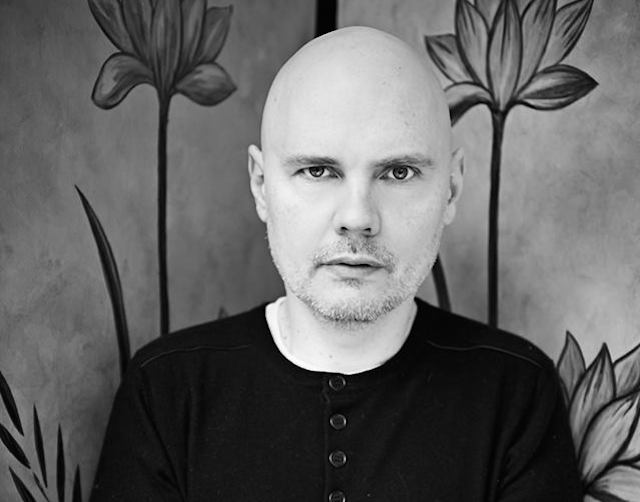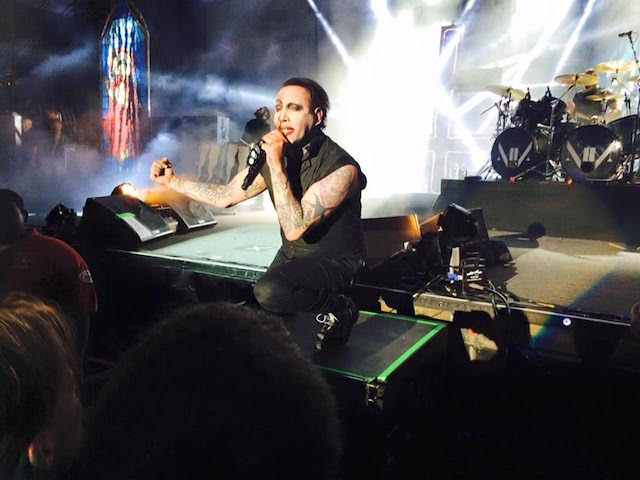Smashing Pumpkins And Marilyn Manson Bring 'End Times' To Northerly Island
By Chicagoist in Arts & Entertainment on Aug 10, 2015 3:37PM

Billy Corgan of the Smashing Pumpkins, photo via The Smashing Pumpkins Facebook page
The "End Times" is a concept in many different religions, usually marking a catharsis or revealing of the ultimate fate of the universe. And Friday night at the First Merit Bank Pavilion on Northerly Island, there was certainly some kind of breakthrough. A meeting of two bands—The Smashing Pumpkins and Marilyn Manson— The End Times Tour found both bands recognizing their gifts, delivering them in spades and actually having a good time.
Both The Smashing Pumpkins and Marilyn Manson are really solo acts dressed up as living, breathing bands, but that means absolutely nothing during a loud rock show. Both bands are about to celebrate the 20th anniversaries of their most iconic works (Mellon Collie & The Infinite Sadness and Antichrist Superstar, respectively) but don't have much interest in re-hashing the past.
The Smashing Pumpkins’ leader Billy Corgan is a restless experimenter, whether its with his musical collaborators, his interest in professional wrestling or owning throwback teahouses. His pared-down solo set at Ravinia last summer found the songwriter still a kid in a candy shop, turning old songs into new animals and playing around with huge antique synthesizers, completely toppling the traditional idea of "singer-songwriter."
Manson has had a more difficult road to icon status. Initially discovered and signed by Trent Reznor, the guy was always more of a goth-metal version of a playwright, bringing vivid, however shocking, images to an audience ready to be entertained. The first two Marilyn Manson albums (1994's Portrait Of An American Family and 1996's Antichrist Superstar) hit at a perfect time, where Jerry Springer was the closest thing to social media a teenager had. Once 1998's Mechanical Animals came out, on which Corgan was a collaborator, the climate was ripe for a breakthrough. Millions of disillusioned, supposedly white-trash teens had their deity.
Along with Eminem and Insane Clown Posse, Manson meant an escape and a team to join, and the MTV/TRL culture co-signed the revolution. However, the revolution was short lived. Enter Columbine and other school shootings. Suddenly, Manson's music was an easy scapegoat. Why would we support an artist making music for disillusioned, cold-blooded killers? Then 9/11 put the kibosh on shock-rock, as everyone took inventory of their situation and realized they didn't have it so bad.
Opener Cage made a name for himself in the early aughts, being mentioned by Eminem and helping the independent hip-hop boom collaborating with groups like Smut Peddlers, The High & Mighty and The Weathermen while recording for substantial independent labels like Rawkus, Eastern Conference and Definitive Jux. His acidic, nasally flow blew clouds of skilled lyricism over inventive production.
However, Friday night found Cage in a bad spot. Looking gaunt and pale, the rapper slurred unrecognizable verbiage over half-baked rap rock. Neither good hip-hop nor good punk rock, the new material was in an emo netherworld where fans of either genre had nothing to get behind.
While the roadies put together the extravagant Marilyn Manson stage set, The Louvin Brothers' "Satan Is Real" blared out of the sound system, creating a eery vibe with the 1959 country western ballad. Right out of the gate, Manson's band sounded thick and sturdy, making the show not only look awesome, but sound awesome as well. While certain Manson go-tos like "The Beautiful People," "The Dope Show" and "Disposable Teens" all the hit the mark, one of the set's highlights was the new song "Third Day Of A Seven Day Binge" off the new album The Pale Emperor. A gorgeous Nirvana-meets-R.E.M. riff melded beautifully with Manson's Bowie baritone, creating an instant impression.
But the music is really a minor part of a Marilyn Manson show. His stage presence is that of a seasoned professional. A little more burly in his middle age, Manson's dad-bod makes him even creepier, lumbering around the stage like some sort of menace. One song he's singing from a butcher knife microphone, the next he's singing to his congregation a top a pulpit and the next he is setting a Bible on fire. The highlight of his set was "Sweet Dreams," as he came out on stilts and moved around the stage like a Satanic praying mantis. Absolutely the stuff of nightmares.
While intense imagery is Manson's forte, The Smashing Pumpkins certainly created their own universe through their collection of era-defining music videos. However, Billy Corgan and company—joined on this tour by original drummer Jimmy Chamberlin, Jack Bates on bass and longtime guitarist Jeff Schroeder—now let the music speak for itself. Playing somewhat of a greatest hits set, the band has never sounded so expansive and muscular. The sound at the pavilion was full-bodied and nuanced, something super-rare at outdoor band shells.
It's been commonplace for middle America to turn its collective back on once-popular bands. However, those who have stayed with The Smashing Pumpkins have been rewarded greatly. No other band has survived the grunge movement and continued to both challenge and cater to their audience.
Grunge was only a tiny portion of the band's sound. Borrowing from shoegaze, new wave, heavy metal, country, folk, goth and a dozen other flavors, Corgan put all these seemingly disparate influences into a Cuisinart and the end product was shockingly original. No other band could play the heaviest, most volcanic metal and then play the most delicate, hushed reveries like the Pumpkins. Their range is certainly not given the respect they so deserve.
Friday night's set started out with the grinding, monolithic "Cherub Rock" with Jimmy Chamberlin's steamroller attack somehow providing both muscle and dynamics within the same song. The gang ran through epoch-defining classics like "Bullet With Betterfly Wings," "1979," "The Everlasting Gaze" and "Zero" with the subtlety of a jackhammer.
New stuff like "One And All" of the new album Monuments To An Elegy were given extra heft thanks to Chamberlin's touch. Jeff Schroeder's guitar conjured some intense chemistry with Billy especially on highlight "Mayonnaise" which once again careened from gorgeous fingerpicking to all-out sonic assault while still making an emotional impact. Corgan dedicated the lovely "Disarm" to the late-great Chicago power-popper Jim Ellison, who dealt with depression but didn't make it out alive.
Corgan's songs are lived-in pieces of emotional wreckage that are simultaneously personal and universal. Corgan's early work is completely immersed in depression, but at a certain point, he found a light in his music and worked hard to create positivity. The man never stands still, which could be seen as running from something, but maybe he is running towards something instead. Towards a legacy as being the most important Chicago rock band of the past thirty years.
All in all, The End Times Tour was a beautiful night of alternative rock that was birthed in an era free of complete social connectivity. Once, if someone wanted to hear a song they had to do a little extra work—like taping 120 Minutes on MTV, or stay up late for Q101's Cage Match, or venture to the mall to purchase a cassingle.
So this music means a little more to those who were there, especially in this era of here-today gone-tomorrow digital flimsiness. The gorgeous backdrop of the Chicago skyline on one side and Lake Michigan on the other made this an absolute perfect night for a rock show. Hopefully this is not the end of the times after all.
By: Andy Derer
